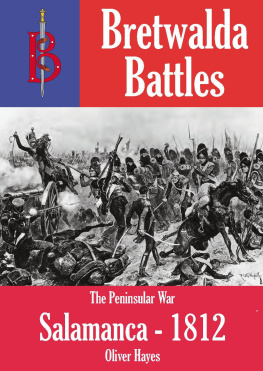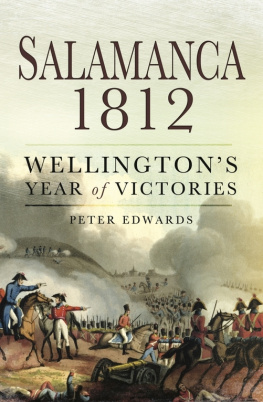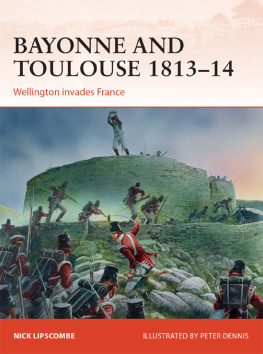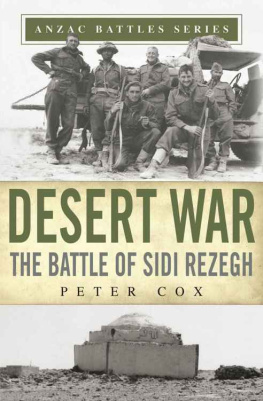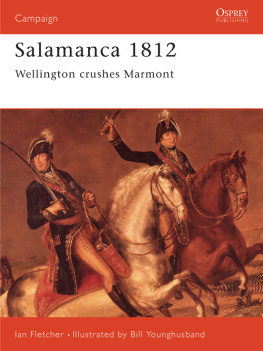ROUTLEDGE LIBRARY EDITIONS: MILITARY AND NAVAL HISTORY
Volume 17
WELLINGTONS MASTERPIECE
WELLINGTONS MASTERPIECE
The Battle and Campaign of Salamanca
PETER YOUNG AND J. P. LAWFORD
First published in 1972
This edition first published in 2016
by Routledge
2 Park Square, Milton Park, Abingdon, Oxon OX14 4RN
and by Routledge
711 Third Avenue, New York, NY 10017
Routledge is an imprint of the Taylor & Francis Group, an informa business
1972 George Allen & Unwin Ltd
All rights reserved. No part of this book may be reprinted or reproduced or utilised in any form or by any electronic, mechanical, or other means, now known or hereafter invented, including photocopying and recording, or in any information storage or retrieval system, without permission in writing from the publishers.
Trademark notice: Product or corporate names may be trademarks or registered trademarks, and are used only for identification and explanation without intent to infringe.
British Library Cataloguing in Publication Data
A catalogue record for this book is available from the British Library
ISBN: 978-1-138-90784-3 (Set)
ISBN: 978-1-315-67905-1 (Set) (ebk)
ISBN: 978-1-138-93042-1 (Volume 17) (hbk)
ISBN: 978-1-315-68047-7 (Volume 17) (ebk)
Publishers Note
The publisher has gone to great lengths to ensure the quality of this reprint but points out that some imperfections in the original copies may be apparent.
Disclaimer
The publisher has made every effort to trace copyright holders and would welcome correspondence from those they have been unable to trace.
WELLINGTONS MASTERPIECE
The Battle and Campaign of Salamanca
by Brigadier Peter Young
and Lieutenant-Colonel J. P. Lawford
I look upon Salamanca, Vittoria and Waterloo as my
three best battles those which had great and permanent consequences.
The Duke of Wellington
Elle classe Lord Wellington presque la hauteur du
duc de Malborough. (sic)
General Foy, writing of the battle
First published in 1973
This book is copyright under the Berne Convention.
All rights are reserved. Apart from any fair dealing for the purpose of private study, research, criticism or review, as permitted under the Copyright Act, 1956, no part of this publication may be reproduced, stored in a retrieval system, or transmitted, in any form or by any means, electronic, electrical, chemical, mechanical, optical, photocopying, recording or otherwise, without the prior permission of the copyright owner. Enquiries should be addressed to the publishers.
George Allen & Unwin Ltd 1972
ISBN 0 04 940037 1
Filmset and Printed in Great Britain
in 11 point Baskerville
by Cox & Wyman Ltd,
London, Fakenham and Reading
To Elisabeth and Bill Catto
in memory of a pleasant holiday in some of
the remoter regions of Spain
Contents
Illustrations
Lieutenant-Colonel Frank Wilson drew the following illustrations, serial numbers 1, 8, 14, 15, 16, 18, 20, 21, 31, 32, 34, 35, 37, 38, 39, 46, 48, 49, 50, 55; these were all based on information from contemporary sources. Serial numbers 2, 5, 8, 11, 24, appear by courtesy of the National Portrait Gallery, 29 and 51 by courtesy of the National Army Museum and numbers 19, 40, 53 by courtesy of the Radio Times Hulton Picture Library. The authors are also indebted to Mr Goodall of the National Army Museum for the invaluable assistance he gave them.
Maps
1. Spain and Portugal
It was six oclock in the evening of December 18, 1811. Dusk was fast obscuring the dilapidated white-walled houses with the dark rectangular sill-less windows and red-tiled roofs, which enclosed the little village square. A solitary rider jogged across it avoiding the piles of stones and dung, and threw the reins of his horse to a waiting groom. A sentry, wearing a long grey great-coat and a black shako on which the brass regimental badge shone dully, snapped his musket to the present; the rider dismounted and disappeared into a house a little more substantial than its neighbours. Wellington, having taken his customary exercise, was returning to his unpretentious headquarters at the village of Freneida some twenty miles from the French-held stronghold of Ciudad Rodrigo. As he strode into the dark cheerless rooms, poorly warmed by charcoal stoves and so badly lit that even at midday his secretaries had to use candles, the Peer, as he was called by his staff, had much to occupy his mind.
Wellington was at this time forty-two years old, about five feet ten inches in height, strongly, but not heavily built; a great beaked nose jutted out between a high forehead and a long chin; he had a firm mouth, but his eyes were his dominating feature, eyes that flashed with an icy blue fire when he was displeased, or sparkled with amusement when his great neighing laugh announced that his somewhat sardonic sense of humour had been touched, or became veiled and remote when he withdrew into his own clear logical world. Years of command had given him an air of effortless authority and a cold unshakeable composure, but beneath the rigid self-control, a dynamic restless energy could be sensed. Here was a man to whom the doubts and hesitations of normal humanity seemed unknown, a man utterly confident in his own powers and perhaps a little contemptuous of those of others, a man whose calm imperious decisions it would be difficult to question and dangerous to disobey.

Yet the Peer could relax when surrounded by his young, high-spirited ADCs, his young men as he called them, or when a pretty feminine face caught his fancy, a not infrequent occurrence; and he was capable of sudden unexpected acts of kindness that came almost strangely, as though a god had descended from Olympus and discerned the needs and weaknesses of ordinary mortals below. In military matters perhaps his most outstanding quality was an almost inhuman sanity, an ability to weigh the significance of events with a dispassionate detachment, a complete lack of emotion that gave his judgement a certainty that was almost chilling.
The present situation called for all his powers. It was nearly four years since a British Government, seeking to strike back at Napoleon, the Emperor of France it refused to acknowledge, had seen an opportunity on the Iberian Peninsula. Napoleon, after a long and tortuous series of intrigues, had deposed the Spanish ruling House and proclaimed his brother, Joseph, King of Spain and Portugal. It was too much for two proud nations, and both countries revolted against the French oppressor. Europe, cowed by the invincible armies of France, watched events unfold, scarcely doubting a speedy French triumph; but to its amazement, a French general, Dupont, with an army of 18,000 men, managed to trap himself at Baylen in Spain and, surrounded by superior forces in difficult country, proceeded to surrender. With a praiseworthy optimism, little justified by the past events of the war, the British Government determined to intervene.












